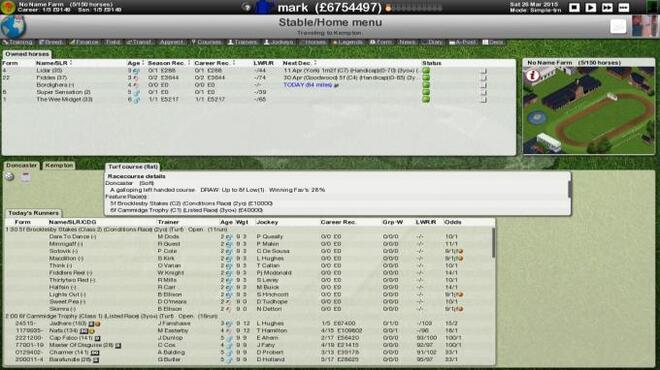
The general picture of public opinion in Russia can be understood in rather simple terms. Note: This paper is based on sociological research and opinion polling carried out across Russia by the Levada Center from February to August 2022, as well as on the findings of eight Levada-convened focus groups that were held from March to May 2022 in Moscow and in three regional centers. A more careful reading of sociological data, including conversations with focus group participants and quantitative research, presents a far more complex picture of Russian society.
STARTERS ORDERS 6 FAST FORWARD FULL
Put another way, the impression that Putin now has the full support of the Russian public is simply incorrect. First and foremost is the fact that rather than consolidating Russian society, the conflict has exacerbated existing divisions on a diverse array of issues, including support for the regime. 4ĭenis Volkov is the director of the Levada Center in MoscowĪt the same time, a careful reading of popular Russian attitudes toward the war reveals important nuances that all too often are overlooked. It’s not right,” Marin said in mid-August. “It’s not right that at the same time as Russia is waging an aggressive, brutal war of aggression in Europe, Russians can live a normal life, travel in Europe, be tourists. 3 According to Zelenskyy, “he most important sanctions are to close the borders-because the Russians are taking away someone else’s land” and Russians should “live in their own world until they change their philosophy.” He added, “The population picked this government and they’re not fighting it, not arguing with it, not shouting at it.” Such sentiments are echoed in calls by some European politicians, such as Finnish Prime Minister Sanna Marin, for an EU ban on tourist visas. Partly in response to these indicators, figures like Ukrainian President Volodymyr Zelenskyy have called for a visa ban for all Russian passport holders, with an exception for people whose safety is at risk or who are vulnerable to political persecution. Contrary to expectations, Putin’s popularity has also seen a boost, similar to what happened in the immediate wake of the 2014 annexation of Crimea. Indeed, public opinion polls have consistently shown overwhelming support (70 percent or higher) for what Moscow calls its “special military operation” in Ukraine.

2 But hopes of Russian grassroots opposition to the war were swiftly dashed. There was optimism that ordinary Russians would not countenance a war against a neighboring country. It was aimed, first and foremost, at drawing a distinction between the actions of the Kremlin and the attitudes of ordinary Russians. When Russia launched its invasion of Ukraine on February 24, Western governments, including the United States, immediately condemned what they described as “Vladimir Putin’s war.” 1 Surely, this formulation was no accident.


 0 kommentar(er)
0 kommentar(er)
